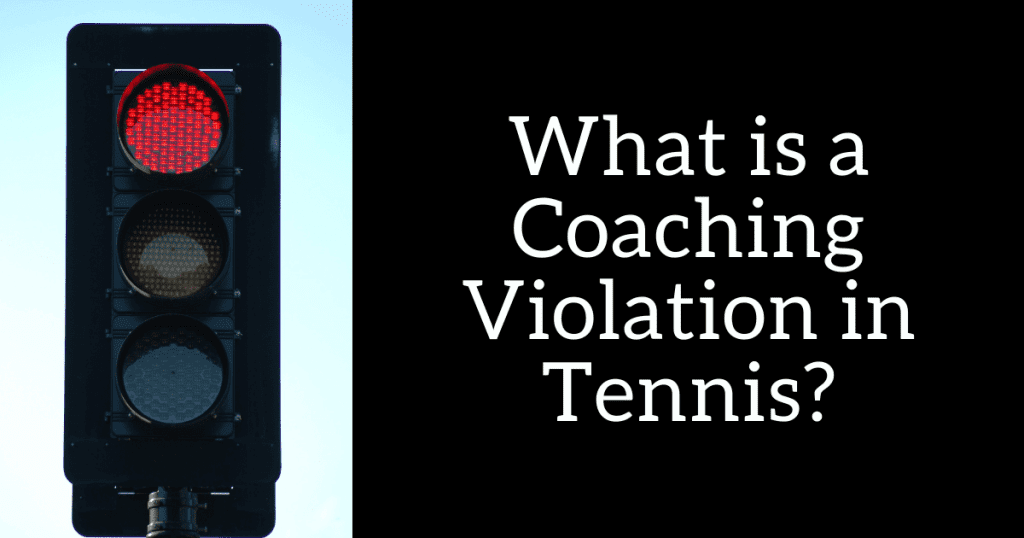Tennis is known as being a gentleman’s sport. Fairness. Following the rules. Where do coaching violations in tennis fit in a world of fair play?
You might wonder what it means when a player is penalized with a coaching violation. They don’t happen often, but let’s delve into the world where being coached is unauthorized.
Contents
What are Coaching Violations in Tennis?
Tennis is one of the few sports that does not allow in-match coaching. Players cannot receive strategic advice from their coaches or trainers while the match is being played.
While tennis players of all skill levels can benefit from the expertise of a coach during their training and practice sessions, they are strictly prohibited from receiving advice during a tournament match.
According to the official rules for the Grand Slam Tennis Tournaments: “Players shall not receive coaching during a match, including during the warm-up phase. Communications of any kind, audible or visible, between a player and a coach may be construed as coaching.”
Since coaching is strictly prohibited at these major tournaments, any player receiving in-match or warm-up coaching will receive a coaching violation, which carries varying degrees of punishment.
What are the Punishments for Coaching Violations in Tennis?
It is up to the umpire to make the call on whether or not a competing player was receiving coaching. If the umpire decides the player was being coached, the offending player first gets a warning (per the Point Penalty Schedule).
A warning does not carry an actual penalty but usually means the officials will monitor the player and their coach more closely for the remainder of the match.
Warnings are announced verbally by the umpire so the player, coach and audience know the violation has occurred.
If the umpire notices a second coaching offense, they will issue a coaching violation, which carries a point penalty. A point penalty is also announced by the umpire.
After the offending player has been docked a point for a coaching violation, the next level is a game penalty. Any player caught receiving coaching for the third time will lose an entire game.
At this point, the officials usually remove the coach along with any other coaches or trainers the player may have brought to the tournament.
Why is In-Match Coaching Prohibited?

Since coaches play an important role during other major sports, you might be wondering why coaching is banned in tennis.
There are numerous historical reasons why coaching is prohibited during tennis matches. The main reason is to preserve the fact that tennis is a sport played between individuals in its purest form.
While there is a team component to doubles tennis, it is still meant to be played out just between the players on the court.
In tennis, in-match coaching is seen as an unfair advantage, as the sport tests the physical and mental prowess of the players on the court.
As such, some tennis players, officials, and spectators view in-match coaching as unsporting and even disrespectful.
Rather than having a coach provide tips and pointers about the opponent’s potential weaknesses, it is up to each player on the court to figure out how they can break their opponent down and win the match.
Is There a Place for On Court Coaching?
All types of tennis coaching were once looked down upon, even when it was taking place outside of competition.
Tennis culture has always placed a great deal of value on the concept of fairness and equality of opportunity. Where wealthier players could afford to hire professional coaches, those of lesser means had to rely upon solely their abilities.
Things have changed in the modern era and the sport has now embraced the idea of hiring coaches and trainers. However, the coaching provided must take place outside the match setting.
Today, the top players rely heavily upon the expertise of their coaches during their training and practice sessions.
There is no shame in taking tennis lessons or hiring a coach to help you improve your skills. However, you should not rely on your coach during competitive matches. Even at the amateur level, in-match coaching is frowned upon, and, in many cases, it is strictly prohibited.
Instead of expecting your tennis coach to help you win matches by directly offering feedback and advice, put what they taught you during your training sessions into practice during each match.

